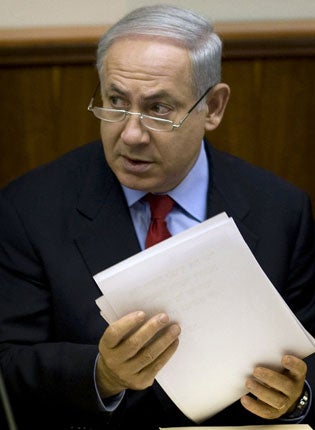Tension mounts as Israel tests its defences

Your support helps us to tell the story
From reproductive rights to climate change to Big Tech, The Independent is on the ground when the story is developing. Whether it's investigating the financials of Elon Musk's pro-Trump PAC or producing our latest documentary, 'The A Word', which shines a light on the American women fighting for reproductive rights, we know how important it is to parse out the facts from the messaging.
At such a critical moment in US history, we need reporters on the ground. Your donation allows us to keep sending journalists to speak to both sides of the story.
The Independent is trusted by Americans across the entire political spectrum. And unlike many other quality news outlets, we choose not to lock Americans out of our reporting and analysis with paywalls. We believe quality journalism should be available to everyone, paid for by those who can afford it.
Your support makes all the difference.Israel yesterday kicked off a massive five-day civil defence exercise aimed at testing the Jewish state's preparedness for rocket and chemical attacks. Israeli officials sought to reassure Syria and Lebanon that it has no plans to launch an attack.
The nationwide operation is likely to raise tensions between Israel and its neighbours at a time when tempers are already frayed over Iranian-backed Hizbollah's efforts to rearm along Israel's northern border.
The exercise, code-named "Turning Point Four", is Israel's largest civil defence operation since it first launched the annual drill four years ago in the wake of the Lebanon war, during which Hizbollah fired thousands of rockets into northern Israel. "This is an exercise which has been scheduled for a long time and is not the result of any unusual security development," the Israeli Prime Minister, Benjamin Netanyahu, said yesterday. "Israel seeks calm, stability and peace, but it is no secret that we live in a region where there is a threat from missiles and rockets."
The exercise will test responses of the municipal authorities to simulated rocket and missile attacks from the Gaza Strip, controlled by the Palestinian group Hamas, and Hizbollah guerrillas in Lebanon, Israeli officials said. The drill will also test the reactions of the civilian population with a 90-second air raid siren scheduled for Wednesday morning – a signal for Israelis to head for the nearest secure shelter.
In December 2008, Israel launched a crushing 22-day military offensive on Gaza to curb rocket attacks. 1,400 Palestinians were killed in the incursion, and 13 Israelis. A UN agency reported on Saturday that three-quarters of the damage inflicted on Gaza by Israel's war against Hamas more than a year ago has not been repaired or rebuilt.
Arab leaders are angry about the drill. The Lebanese Prime Minister, Saad Hariri, warned that the exercise runs counter to newly-launched Middle East peace efforts between Israel and the Palestinians, while the Syrian President, Bashar al-Assad, urged the West to "contain Israel and put an end to its extremist policies," according to Syria's Sana news agency.
Hizbollah reportedly said that it had mobilised thousands of additional fighters and raised its alert level ahead of the exercise.
Israel has relayed messages to Arab states that it has no plans to launch an attack on its neighbours. "We have no intention of starting a war in the north," Ehud Barak, the Defence Minister, said at yesterday's cabinet meeting.
The French Foreign Minister Bernard Kouchner said yesterday that he was "reassured" that tensions had eased in recent days between Israel and its Arab neighbours. He was visiting Damascus and Beirut to ensure all sides hold to a UN resolution that bans the supply of arms to Hizbollah. President Assad told Mr Kouchner that it was not in the interests of Syria, Hizbollah or Iran to start a new conflict, AFP quoted a French diplomat as saying.
Israeli officials have publicly expressed concerns over Hizbollah's efforts to rearm, and claim that it has built up an arsenal of over 40,000 rockets, some of them long-range.
The Israeli President, Shimon Peres, last month accused Syria of providing Hizbollah with a shipment of Scud missiles, a powerful weapon capable of reaching Israeli cities and inflicting mass casualties. Syria has vehemently rejected the claims, alleging that Israel is seeking a pretext for war.
Analysts say that Hizbollah is unlikely to launch an attack on Israel in the near future, but warn that rising tensions over Iran's nuclear ambitions could precipitate a more serious stand-off with Hizbollah, Iran's proxy in the region.
Israel has pressured the international community to impose crippling sanctions on Iran, which is widely suspected of trying to develop a nuclear weapon, and has hinted that it could launch a unilateral strike if patience runs thin.
"The prospect should remain on the table," said Itamar Rabinovich, Israel's former chief negotiator with Syria. "Without a credible threat, diplomacy will have no edge."
Join our commenting forum
Join thought-provoking conversations, follow other Independent readers and see their replies
Comments